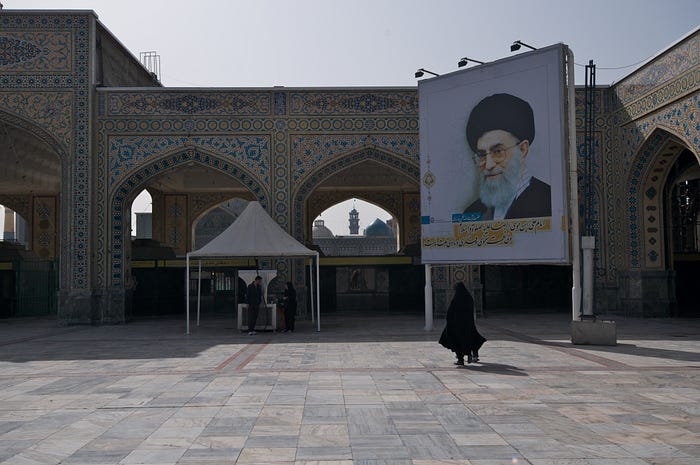Iran is sowing chaos and terror in the Middle East and beyond.

In February 2022, Russian President Vladimir Putin shocked the world by launching a full-scale military invasion of Ukraine. In retrospect, and even at the time, it shouldn’t have been much of a shock to the world’s geopolitical expert class.
By the time 2022 rolled around, Russia had already been on wartime footing with Ukraine since at least 2014. The Ukrainians had already lost thousands of soldiers and civilians by the time Putin moved on Kyiv in February 2022.
On October 7, 2023, the terrorist forces of Hamas shocked the world by launching the most heinous and brutal attack on Israeli citizens since the Holocaust. Hamas terrorists tortured, raped, and murdered over 1,200 people in the space of a few hours.
Still, the geopolitical expert class could have predicted the attack. As most foreign policy experts know — and indeed Israel’s security forces know best of all — Hamas has long been gunning for Israel. Hamas terrorists and their affiliates always make their anti-Semitic motives and genocidal plans well-known in the region.
What Hamas lacked, before October 7, wasn’t motive to attack Israel but opportunity. With the debacle that was the U.S. withdrawal from Afghanistan in 2021, Iran emboldened and newly enriched, and the rest of the world distracted by the war in Ukraine, Hamas saw an opportunity to commit the atrocities to which the terror organization is singularly dedicated and took it.
There are other dangerous hotspots in the world; with these in mind, and with the benefit of hindsight, it isn’t difficult to pinpoint where the next geopolitical conflagration might occur.
Tensions between China and Taiwan, for instance. The border North Korea shares with South Korea is another such potential global hotspot.
The Iran-Pakistan border is another. Like Russia with Ukraine, like China with Taiwan, Iran has been testing the border and Pakistani authorities with increasing frequency and determination in recent years.
Since 2021, Iran has steadily been ratcheting up terror to destabilize the region. Working as a chaos agent, the Iranian government has funded terror campaigns, armed radicals, and waged proxy wars against its neighbors.
Since it shares a border with Iran and a long-simmering conflict, Pakistan was bound to become the victim of Iran’s deadly schemes and machinations.
“The latest Iranian missile attacks on Pakistan add to a long list of incidents that led to border tensions between the neighbours,” reported Al Jazeera on January 17, 2024.
The border has been heating up since 2023.
11 Iranian security officers were killed in Iran’s southeastern border region in December. In June, two Pakistani soldiers were killed at a border checkpoint. Four of Pakistan’s border patrol agents were killed in a different borderline region in April.
These increasingly fraught episodes have been amping up the tension in an already explosive region. Similar incidents occurred in 2021, 2019, and 2018. In 2023, however, incidents of border violence between Pakistan and Iran have been increasing.
“Both nations have long fought militants in the restive Baloch region along the border,” reported Sophia Saifi, Adam Pourahmadi, Azaz Syed, and Jesse Yeung for CNN this morning.
“The opening salvo in this fast-moving sequence of events began Tuesday when Iran conducted strikes on Pakistan’s Balochistan province — killing two children and wounding several others, according to Pakistani authorities,” they continued. “The separatist militant group operates on both sides of the Iran-Pakistan border and has previously claimed responsibility for attacks against Iranian targets.”
Pakistan was left with little choice but to strike back.
“Pakistani retaliatory strikes in Iran kill at least 9, raising tensions along border,” Munir Ahmed and Jon Gambrell reported for the Associated Press today.
“The unprecedented attacks by both Pakistan and Iran on either side of their border appeared to target Baluch militant groups with similar separatist goals,” mused Ahmed and Gambrell. “The countries accuse each other of providing a haven to the groups in their respective territories.”
Iran is unquestionably growing emboldened in the region over the past three years.
“Iran cannot strike Israel,” Iraq’s Finance Minister told the assembled leaders of Davos this year.
“Hours before Iraq filed a complaint against Iran to the Security Council, the Iraqi Foreign Minister Fouad Hussein condemned, in an interview with Asharq Al-Awsat, Iran’s attack on Irbil, considering the escalation ‘an attempt by Iran to export its internal problems,’” reported Najlaa Habriri and Asharq Al-Awsat for Arab News today.
“Hussein, who was speaking on the sidelines of the World Economic Forum held in Davos, said that ‘his country has taken political and diplomatic measures to respond to the Iranian bombardment that killed 4 civilians in Irbil on Monday evening,’ denying Tehran’s claims about the presence of the Israeli Mossad in Iraq,” reported Al-Awsat and Habriri.
Iran has been busy elsewhere, too.
“Iranian Regime and Hezbollah Linked to Ecuador’s Escalating Violence,” warned Mahmoud Hamidi for Iran News Update earlier this week.
“Emanuele Ottolenghi, an expert on the role of Iran, Hezbollah, and terrorist organizations in Latin America, asserts that ‘Hezbollah remains deeply enmeshed in servicing the cartels through money laundering,’” wrote Hamidi. “This revelation underscores the global network of non-democratic forces collaborating in illegal activities.”
Will Pakistan stand up to Iran before it’s too late?
If not, who will Iran attack next?
(contributing writer, Brooke Bell)